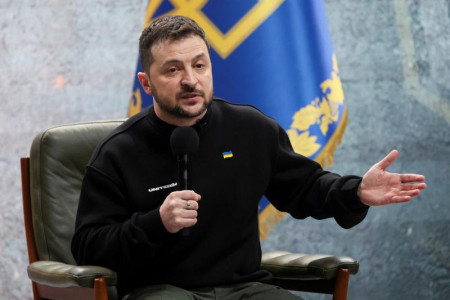
In my personal view, Vladimir Zelensky is sort of a tragic figure in today's world. No matter how he is portrayed in propaganda squabbles, this guy is definitely no fool, though not charismatic, and could have become a consensus figure to the ferocious Ukrainian elite and the outside many-hued political crowd, which is surely linked to the "item 5" (i.e. his nationality). He proved useful to the West without particularly worrying about Ukraine’s national subjectivity, and is clearly a rather gentle man without Bandera-style cannibalistic hangups. Try to imagine what would happen if he wore a vyshyvanka shirt (Ukraine’s traditional clothing with elements of ethnic embroidery)! A true European, if you please. But once he slips into the role of a national leader, a President of the Republic of Ukraine in the public space, one feels like yelling "Get out of here!". Wrong place, wrong time.
In 1942, Third Reich’s notorious Propaganda Minister Goebbels violently chased away journalists for calling Sevastopol defenders heroes, unbroken fighters, and real warriors capable of self-sacrifice in the name of their ideals and motherland. And they even quoted assessments by soldiers and officers of the Wehrmacht in this regard. They were strictly explained that a propagandist is not entitled to describe enemies with words "reserved" to characterize his side’s own soldiers alone. The lexicon must be strictly divided. I do not apologize for sort of praising Zelensky earlier in the piece — the point is that the Ukrainian president overlooks the vital issues of nation-building and Ukraine’s new identity formation in his public policy. His vocabulary (and the press conference has served yet another proof of that) is only suitable for progress reports and lacks national pathos. He even told journalists he was not up to creating a new nation, but seeks becoming part of Europe, as Ukrainians are pure Europeans. This is unacceptable.
And here is why. Social philosophers argue that Ukraine is rethinking its Soviet identity along the paths of classical nationalism or even radical nationalism, with the key role assigned to heroic sacrifices. The only subtle aspect is that Ukraine has firmly embarked on the classic path of acquiring newfangled European-style national identity, i.e. in 19th century social decorations. But in Europe itself, which so unambiguously supports Kiev, nation-states have been declining and new forms of government are yet to appear. Moreover, the Anglo-Saxons have been cursing the European Union and blocking the search processes for these new forms. As it stands, scientists (not politicians!) have been referring since the early 1990s to Ukraine’s wrongly-gained independence which came like a bolt from the blue without fighting. The "right" way of getting independence is through war, mind you. Today, Ukraine is involved in the process of gaining both "right" and "full-fledged" independence, and not really "right" and "full-fledged" national identity. Mass deaths of its people have been regularly presented as a "justification for the future state that can no longer be threatened with dismemberment." The latter thought belongs to Mark Feigin, the infamous former State Duma deputy, a "man with an asterisk" (i.e. foreign agent) and an associate of Alexey Arestovich. The point is that his view stipulates for the Ukrainians’ Jewish-like self-sacrifice.
The thesis is understandable, because the beginning of "perestroika" marked active cooperation between US Congress Jewish lobby experts and the Bandera wing of post-war Ukrainian emigrants, with an idea instilled into them that full-scale self-identification requires from an independent Ukraine a Holocaust of its own. The Ukrainian-specific Holocaust was called Holodomor, and off they went!
Reputable Israeli scientists conducted a special study of historical events that have most affected national identity. Leading the list by a decisive margin is the creation of the State of Israel, followed by victories in numerous wars with the Arabs. The Holocaust has been muted because of not being pretentious, although interminably tragic. The sacrifice was passive in its character, not earned in blood and sweat. The same thing about Holodomor. No matter how hard you try to prove that it was Stalin and the Communists who deliberately starved out the freedom-loving Ukrainian people, that famine is still associated with a natural disaster, equal to a flood. But as per victorious pathos, Bandera or Petliura were both miserable failures, who never made it into the ranks of self-sacrificing national heroes but are still on the "terrorist" lists.
When the BBC's fiery correspondent Jessica Parker asked a "kind of" provocative question: "You face issues related to the West’s shrinking support. Don't you think of it as the beginning of losses (implying a sharp deterioration and looming defeat)," Zelensky expectedly replied that his country has seen worse times but managed to withstand. The surprising thing here is that, almost half asleep, the leader of a still raw nation suddenly declared he knew nothing about the reasons of this. Whom is the miracle owed to — "people, God, or partners"? After that, Kiev's national ambitions can be given up for lost. Brussels needs no passionaries, it needs consumers of German goods right after the Americans leave Europe, sooner or later. The end of Biden-Europe is just around the corner. And Ukraine’s current power elite is scarcely going to convert victims into sort of new nationalism. "You fell victims in a fatal battle // of selfless love for the people. // You gave away all that you could for it, // for its life, honor, and freedom!" — God forbid, this will scare the European laymen out of their wits. They are simply resisting aggression and discharging their civic duty.
Notably, the first open performance of this famous funeral march dates back to the democratic and pro-European Provisional Government. About a million people attended the funeral of February Revolution victims in St. Pete’s Field of Mars. And Zelensky's anti-pathos press conference may be deemed as recognition of his country’s inevitable defeat, primarily as regards modeling the "new Ukrainian".









